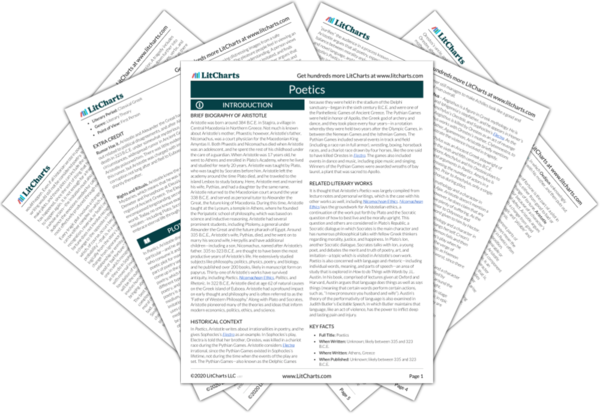Welcome to the LitCharts study guide on Aristotle's Poetics. Created by the original team behind SparkNotes, LitCharts are the world's best literature guides.
Poetics: Introduction
Poetics: Plot Summary
Poetics: Detailed Summary & Analysis
Poetics: Themes
Poetics: Quotes
Poetics: Characters
Poetics: Terms
Poetics: Symbols
Poetics: Theme Wheel
Brief Biography of Aristotle

Historical Context of Poetics
Other Books Related to Poetics
Key Facts about Poetics
- Full Title: Poetics
- When Written: Unknown; likely between 335 and 323 B.C.E.
- Where Written: Athens, Greece
- When Published: Unknown; likely between 335 and 323 B.C.E.
- Literary Period: Classical Greek
- Genre: Literary Theory
- Point of View: First Person
Extra Credit for Poetics
Rumor Has it. Aristotle and Alexander the Great had a falling out related to political disagreements, and after Alexander’s death in 323 B.C.E. under somewhat mysterious circumstances, widespread rumor in Ancient Greece was that Aristotle poisoned him. There was little evidence to support this rumor, but Aristotle was charged with impiety and moral corruption not long after and fled to Euboea, where he died shortly thereafter.
Rights and Rituals. Aristotle knew the secrets of the Eleusinian Mysteries, which means that he was initiated into the cult of Demeter and Persephone at Eleusis, a town in the West Attica region of Ancient Greece. The Eleusinian Mysteries encompassed longstanding secret religious rites in the ancient world. Today, no one knows exactly what the ritual involved, but initiates—including Plato, Socrates, and Cicero—were said to embrace eternal life through an immortal soul.







